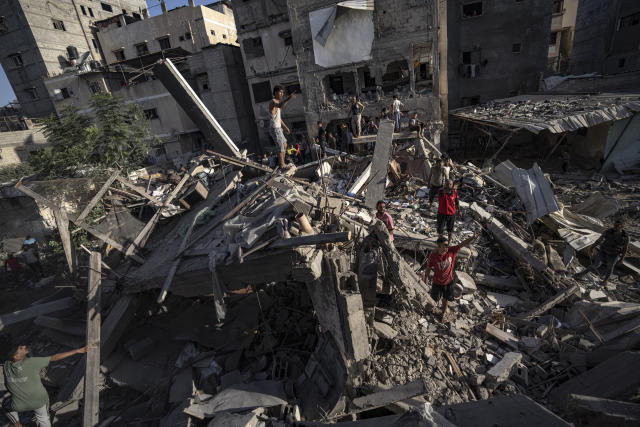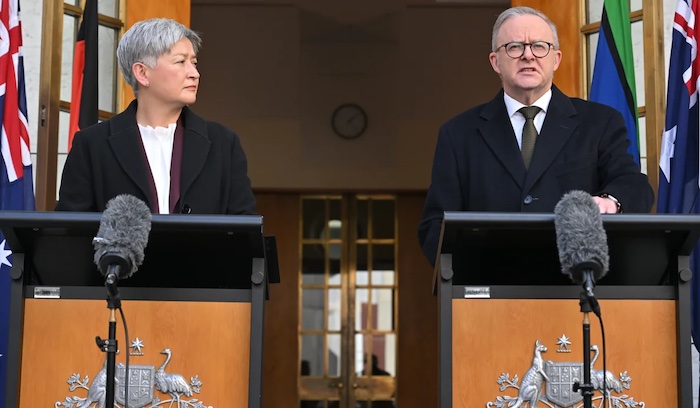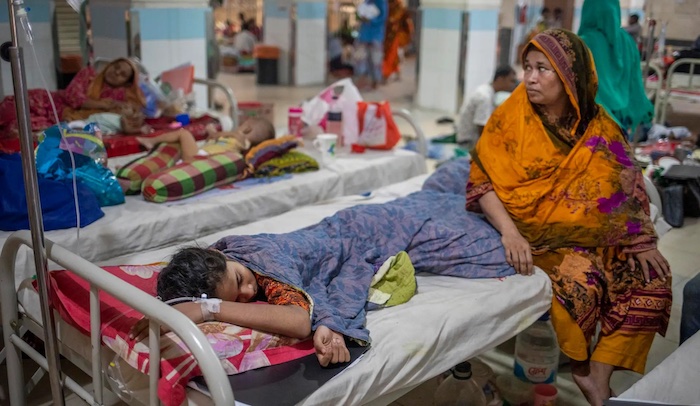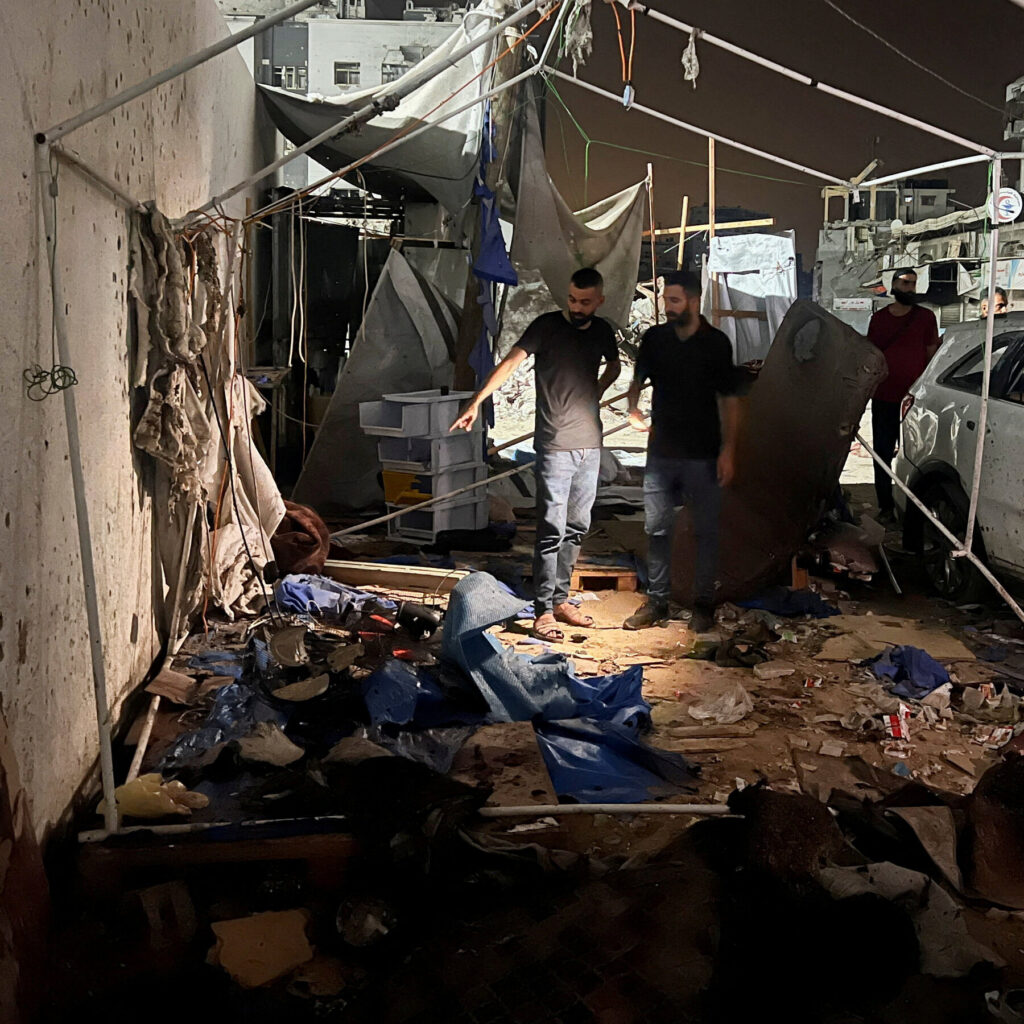Israeli warplanes struck a refugee camp in the Gaza Strip early Sunday, killing at least 40 people and wounding dozens, health officials said. The strike came as Israel said it would press on with its offensive to crush the territory’s Hamas rulers, despite U.S. appeals for a pause to get aid to desperate civilians.
The soaring death toll in Gaza has sparked growing international anger, with tens of thousands from Washington to Berlin taking to the streets Saturday to demand an immediate cease-fire.
Israel has rejected the idea of halting its offensive, even for brief humanitarian pauses proposed by U.S. Secretary of State Antony Blinken during his current tour of the region. Instead, it said that Hamas was “encountering the full force” of its troops.
“Anyone in Gaza City is risking their life,” Israel’s Minister of Defense Yoav Gallant said.
Large columns of smoke rose as Israel’s military said it had encircled Gaza City, the initial target of its offensive. Gaza’s Health Ministry has said more than 9,400 Palestinians have been killed in the territory in nearly a month of war, and that number is likely to rise as the assault continues.
Airstrikes hit the Maghazi refugee camp in central Gaza overnight, killing at least 40 people and wounding 34 others, the Health Ministry said. It said first responders and residents were still digging through the rubble, hoping to find survivors.
An Associated Press reporter at a nearby hospital saw eight dead children, including a baby, who had been brought in after the strike. A surviving child was led down the hospital corridor by an adult holding her hand, her clothes caked in dust, an expression of shock on her face.
Arafat Abu Mashaia, who lives in the camp, said the Israeli airstrike flattened several multi-story homes where people forced out of other parts of Gaza were sheltering.
“It was a true massacre,” he said early Sunday while standing on the wreckage of destroyed homes. “All here are peaceful people. I challenge anyone who says there were resistance (fighters) here.”
There was no immediate comment from the Israeli military.
The camp, a built-up residential area, is located in the evacuation zone where Israel’s military had urged Palestinian civilians in Gaza to seek refuge as it focuses its military offensive on the north.
Despite such appeals, Israel has continued its bombardment across Gaza, saying it is targeting Hamas fighters and assets everywhere and accusing it of using civilians as human shields. Critics say Israel’s strikes are often disproportionate, considering the large number of women and children killed.
Blinken met with Palestinian President Mahmoud Abbas in the occupied West Bank on Sunday, a day after meeting with Arab foreign ministers in neighboring Jordan. Abbas has had no authority in Gaza since Hamas routed forces loyal to him in 2007.
Blinken met with Israeli Prime Minister Benjamin Netanyahu on Friday, who insisted there could be no temporary cease-fire until all hostages held by Hamas are released.
Arab leaders have called for an immediate cease-fire. But Blinken said that “would simply leave Hamas in place, able to regroup and repeat what it did on Oct. 7,” when the group launched a wide-ranging attack from Gaza into southern Israel, triggering the war.
He said humanitarian pauses can be critical in protecting civilians, getting aid in and getting foreign nationals out, “while still enabling Israel to achieve its objective, the defeat of Hamas.”
Egyptian officials said they and Qatar were proposing humanitarian pauses for six to 12 hours daily to allow aid in and casualties to be evacuated. They were also asking for Israel to release a number of women and elderly prisoners in exchange for hostages, suggestions Israel seemed unlikely to accept. They spoke on condition of anonymity because they were not authorized to brief the press on the discussions.
Swaths of residential neighborhoods in northern Gaza have been leveled in airstrikes. The U.N. office for humanitarian affairs says more than half the remaining residents, estimated at around 300,000, are sheltering in U.N.-run facilities. But deadly Israeli strikes have also repeatedly hit and damaged those shelters.
Israeli planes dropped leaflets urging people to head south from 10 a.m. to 2 p.m. Few appear to have heeded a similar order the day before.
An Israeli airstrike overnight struck a water well in Tal al-Zatar in northern Gaza, cutting off water for tens of thousands of people, the Hamas-run municipality in the town of Beit Lahia said in a statement early Sunday.
The U.N. said about 1.5 million people in Gaza, or 70% of the population, have fled their homes. Food, water and the fuel needed for generators that power hospitals and other facilities is running out.
The war has stoked tensions across the region, with Israel and Lebanon’s Hezbollah militant group repeatedly trading fire along the border.
In the Israeli-occupied West Bank, at least two Palestinians were shot dead during an Israeli arrest raid in Abu Dis, just outside of Jerusalem, according to the Palestinian Health Ministry. At least 150 Palestinians have been killed in the West Bank since the start of the war, mainly during violent protests and gun battles during arrest raids.



























